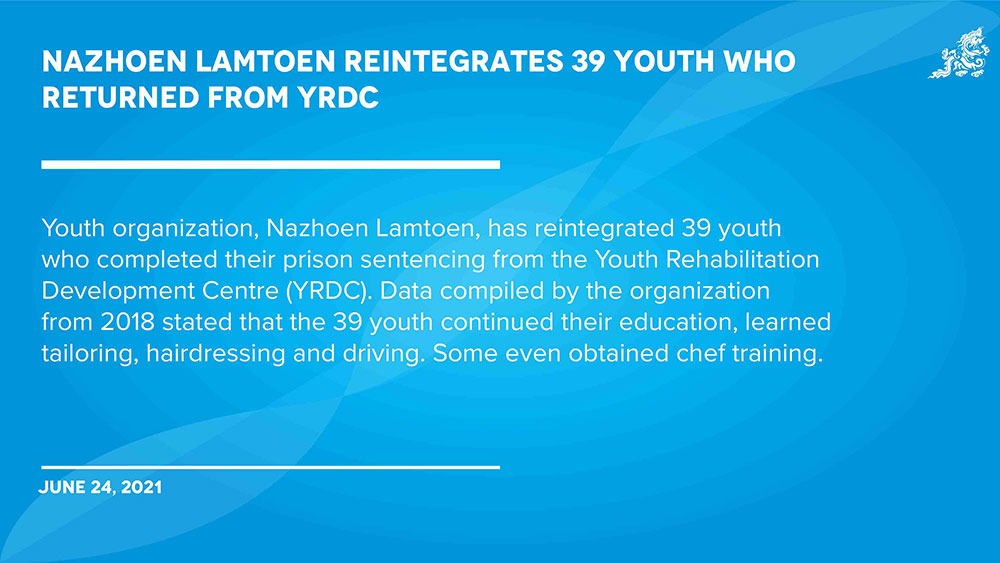Yangyel Lhaden
An organisation dedicated for youth, Nazhoen Lamtoen, has reintegrated 39 youth, who came in conflict with law and completed their prison sentencing from Youth Rehabilitation Development Centre (YRDC).
Although the initiative started from 2013, the organisation started compiling data from 2018, which stated that the 39 youth continued their education, learned tailoring, hairdressing and driving. Some even obtained chef training.
A beneficiary, Dechen Dorji, who is a recovering drug addict said after his release from YRDC in Tsimasham, Chukha, he could not reintegrate in the society, as neighbours warned their children not to be friends with him.
Without friends and guidance, he almost relapsed.
Dechen Dorji did chef training and worked in hotels before the pandemic.
He said counselling sessions at Nazhoen Lamtoen changed him.
After losing the job because of the pandemic, he works in the construction sector and does not avail kidu today.
Another beneficiary, Birkha Gurung, is also a recovering drug addict. He worked as a chef.
He also said that life was difficult for him after his release from YRDC.
Birkha Gurung said he did not have the courage to face people when he was sober. “People judged me from my past.”
He received a scholarship to undergo chef training from Nazhoen Lamtoen and he is working to establish his own restaurant. “I call it a timely intervention from Nazhoen Lamtoen. They helped me become the person I am today.”
Officials working for youth said youth released from YRDC experience social stigma and some commit crime again. “Others are on the verge of becoming recidivist,” an official said.
They said once they come in conflict again, they are sent to Chamgang jail, as they are no longer juvenile.
Officials said for children coming in conflict with law, the phase after being released from rehabilitation centres and YRDC is critical.
An official explained most children who come in conflict with law come from dysfunctional families. “Without proper care and guidance after their release from YRDC, they commit crimes again.”
Nazhoen Lamtoen’s executive director, Thinley Tobgyel, said children, after coming out of YRDC, need guidance, acceptance and support to continue living in society.
He said the organisation was formed with support from Save the Children after four volunteers toured 20 dzongkhags in 2013 to advocate youth about suicide prevention and substance abuse.
He said after their visit to YRDC, youth released from YRDC came looking for them for guidance and support.
Thinley Tobgyel said they felt the need for aftercare when youth came looking for them. “Reintegration programme proved successful as of today with lesser recidivism.”
He said diversion programmes such as serving porridge in Memorial Choeten and construction works also reduced the number of youth going to YRDC. “There are only 18 youth in YRDC today from 60 youth when we first visited.”
Thinley Tobgyel, however, said agencies working for youth have different diversion programmes, as they followed their own guidelines. “Nazhoen Lamtoen, in collaboration with Jigme Singye Wangchuck School of Law, developed guidelines for diversion which would be released soon.
Meanwhile, the Child Care and Protection Act of Bhutan 2011 mandates the National Commission for Women and Children (NCWC) to provide services for children in conflict with law and children in difficult circumstances.
NCWC officials said without support from the government, they could not provide services as mandated in the Act.
An official agreed there is no strong reintegration programme in the country.
Thinley Tobgyel said the organisation depends on donor agencies for funds and it was high time the government implemented provisions in CCPA 2011.
He claimed children come in conflict with law because of the difficult circumstances they are in. “Nazhoen Lamtoen focuses on solving problems from the root. Empowering the family of children in difficult circumstances is one of the components.”
He explained it is not an easy job, as not all families are the same. “Some families are easier to empower by providing them skills training and setting up small businesses. In some cases, both parents are alcoholic.”
Nazhoen Lamtoen takes care of vulnerable children in consultation with NCWC. Today, Nazhoen Lamtoen’s shelter has 16 children. Some children’s parents are in rehabilitation centres.
It was learnt 37 children from the shelter have been reunited with family after empowering them.
Thinley Tobgyel said protecting children could be done by empowering the family and creating a conducive environment at home. “Many of our children do not get basic family care.”
He said a meal together, listening to children’s talk rather than neglecting children by giving them mobile phones when parents are busy would help children become good humans. “Parenting is not complex. Children only need basic care.”
Nazhoen Lamtoen has helped 441 children since 2018.
Edited Tashi Dema


